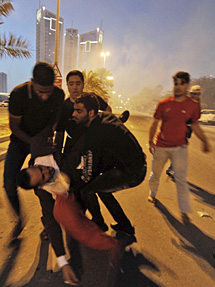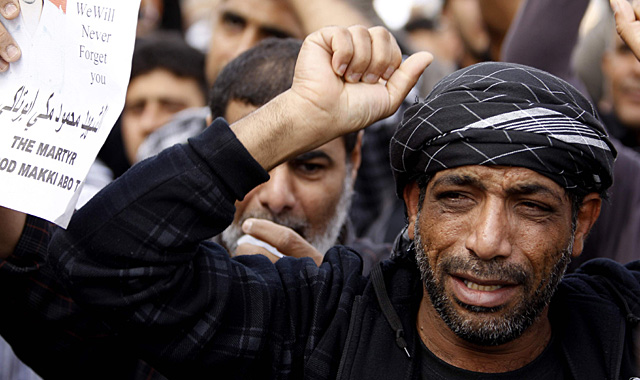Two people died and dozens were wounded, medical sources said, after Egyptian security forces violently disbanded a demonstration Saturday in Tahrir Square in Cairo. According to witnesses, police attacked the demonstrators with tear gas and shots into the air near the Egyptian Museum. The deaths would be the first since the fall of Hosni Mubarak on 11 February.
The Egyptian Health Ministry has only confirmed one dead and 71 wounded. The head of the Central Department of Ministry Intensive Care, Dr. Khaled al-Khatib was quoted by state news agency MENA, said that some of the victims had gunshot wounds. Khatib explained that other wounded were treated with symptoms of respiratory failure, fainting, and various injuries such as bruises.
Incidents of this morning are the first serious recorded between protesters and the army, which was well received during the Egyptian revolution that ended the regime of Hosni Mubarak. On Friday, tens of thousands of people participated in a demonstration in Tahrir to order the trial of Mubarak and other corrupt former leaders and the resignation of charge from the old regime.
The protest went on peacefully until the start of the curfew at 02.00 local time (same time in Spain), when the army tried to disperse the gathering in the square. The intervention of security forces led to clashes. Some protesters, outraged by the actions of the military, threw bottles, stones and set fire to a bus, which was answered by agents with blows.
Most fled to the security forces, witnesses added. Among the harangues of the protesters could be heard phrases like: "Why do we hit the Army and why we shoot?". Hundreds of Egyptians continue on Saturday in the plaza, in a clear challenge to the military. In Tahrir Square, the epicenter of the revolution that ended the Mubarak regime, are obvious signs of crashes that occurred hours earlier when members of the army tried to disperse after curfew to those gathered there.
All access to the site are closed to traffic with barbed wire and fences, pavement is dotted with dozens of broken paving stones and bullet casings, and the center is a truck and a charred bus. "We will stay here until the revolution demands are met and Mubarak trial. We do not want it happen again last night," said Husam Abdelatif Young, referring to what he defined as an attack on the army against demonstrators peaceful.
Incidents of this morning are the first serious recorded between protesters and the army, which was well received during the revolution, when they never attacked the protestors. But the good image of the armed forces appears to have deteriorated since many felt they were not doing enough to end the regime of Mubarak.
Mubarak and his family are forbidden to leave the country, and remain in internal exile in the town of Sharm el-Sheikh. The Army, led the country since the departure of Mubarak, harvesting increasingly critical, especially for the delay in taking legal action against the former dictator and his environment.
Furthermore, this increase also affects the confidence of allegations that some protesters have been tortured by the military and others are facing military trials. "We feel that the Army is not good. He is not doing anything to change the system," said one of those gathered in Tahrir, Mohamed Abdallah.
The expression of the eve named 'Friday the purge, "which was intended to ask the trial of former leaders and other corrupt Mubarak and disclaimer from the old regime, he spent a peaceful until the start of the curfew at 02.00 local time (same time in Spain). "Some military wanted to join us at night and other Army officers came to stop them and arrest them," said Abdellatif, which indicated that this was the spark that triggered the clashes in the square and surrounding streets persecution.
According to Abdellatif, a member of the Youth Coalition January 25, soldiers attacked the demonstrators and caused three deaths and several injuries. However, the Supreme Council of the Armed Forces of Egypt, who runs the country since the resignation of Mubarak, said "the Interior Ministry forces and some civilians repelled honest acts of violence and the curfew applied without recorded victims.
" "There were people who defied the law in Tahrir square after Friday's rally which was attended honest people. These groups conducted disturbances and did not comply with the curfew," the military leadership in a statement. Military leaders also ordered the arrest of businessman Ibrahim Kamel, one of the remnants of exgobernante National Democratic Party, and three of his associates on charges of "inciting criminal acts in the demonstration yesterday Tahrir." In this sense, Abdelatif reported that the Army would have us believe that those who focus on Tahrir are thugs who have nothing to do with the revolution of 25 January.
Ziad Ahmed also insisted the youth, while teaching several shell casings and assumptions of the injured videos on your mobile, that "the army attacked the demonstrators, who at no time had assaulted them." Versions of what happened are contradictory, but what seems clear is that gathered in Tahrir Square stand there and aim to have installed a tent in the center, as they did during the revolution.
It is not the first time that security forces violently suppressed protests. In previous cases, the Army apologized the next day saying they had not given orders to quell the demonstration, and that it was an "unintentional incident." 


The Egyptian Health Ministry has only confirmed one dead and 71 wounded. The head of the Central Department of Ministry Intensive Care, Dr. Khaled al-Khatib was quoted by state news agency MENA, said that some of the victims had gunshot wounds. Khatib explained that other wounded were treated with symptoms of respiratory failure, fainting, and various injuries such as bruises.
Incidents of this morning are the first serious recorded between protesters and the army, which was well received during the Egyptian revolution that ended the regime of Hosni Mubarak. On Friday, tens of thousands of people participated in a demonstration in Tahrir to order the trial of Mubarak and other corrupt former leaders and the resignation of charge from the old regime.
The protest went on peacefully until the start of the curfew at 02.00 local time (same time in Spain), when the army tried to disperse the gathering in the square. The intervention of security forces led to clashes. Some protesters, outraged by the actions of the military, threw bottles, stones and set fire to a bus, which was answered by agents with blows.
Most fled to the security forces, witnesses added. Among the harangues of the protesters could be heard phrases like: "Why do we hit the Army and why we shoot?". Hundreds of Egyptians continue on Saturday in the plaza, in a clear challenge to the military. In Tahrir Square, the epicenter of the revolution that ended the Mubarak regime, are obvious signs of crashes that occurred hours earlier when members of the army tried to disperse after curfew to those gathered there.
All access to the site are closed to traffic with barbed wire and fences, pavement is dotted with dozens of broken paving stones and bullet casings, and the center is a truck and a charred bus. "We will stay here until the revolution demands are met and Mubarak trial. We do not want it happen again last night," said Husam Abdelatif Young, referring to what he defined as an attack on the army against demonstrators peaceful.
Incidents of this morning are the first serious recorded between protesters and the army, which was well received during the revolution, when they never attacked the protestors. But the good image of the armed forces appears to have deteriorated since many felt they were not doing enough to end the regime of Mubarak.
Mubarak and his family are forbidden to leave the country, and remain in internal exile in the town of Sharm el-Sheikh. The Army, led the country since the departure of Mubarak, harvesting increasingly critical, especially for the delay in taking legal action against the former dictator and his environment.
Furthermore, this increase also affects the confidence of allegations that some protesters have been tortured by the military and others are facing military trials. "We feel that the Army is not good. He is not doing anything to change the system," said one of those gathered in Tahrir, Mohamed Abdallah.
The expression of the eve named 'Friday the purge, "which was intended to ask the trial of former leaders and other corrupt Mubarak and disclaimer from the old regime, he spent a peaceful until the start of the curfew at 02.00 local time (same time in Spain). "Some military wanted to join us at night and other Army officers came to stop them and arrest them," said Abdellatif, which indicated that this was the spark that triggered the clashes in the square and surrounding streets persecution.
According to Abdellatif, a member of the Youth Coalition January 25, soldiers attacked the demonstrators and caused three deaths and several injuries. However, the Supreme Council of the Armed Forces of Egypt, who runs the country since the resignation of Mubarak, said "the Interior Ministry forces and some civilians repelled honest acts of violence and the curfew applied without recorded victims.
" "There were people who defied the law in Tahrir square after Friday's rally which was attended honest people. These groups conducted disturbances and did not comply with the curfew," the military leadership in a statement. Military leaders also ordered the arrest of businessman Ibrahim Kamel, one of the remnants of exgobernante National Democratic Party, and three of his associates on charges of "inciting criminal acts in the demonstration yesterday Tahrir." In this sense, Abdelatif reported that the Army would have us believe that those who focus on Tahrir are thugs who have nothing to do with the revolution of 25 January.
Ziad Ahmed also insisted the youth, while teaching several shell casings and assumptions of the injured videos on your mobile, that "the army attacked the demonstrators, who at no time had assaulted them." Versions of what happened are contradictory, but what seems clear is that gathered in Tahrir Square stand there and aim to have installed a tent in the center, as they did during the revolution.
It is not the first time that security forces violently suppressed protests. In previous cases, the Army apologized the next day saying they had not given orders to quell the demonstration, and that it was an "unintentional incident."



- Star Wars + Día de los Muertos = WIN! (08/04/2011)
- Kat Brunnegraff's Muertos Sugar Skull Baby Available Now (04/04/2011)
- Star Wars + Día de los Muertos = WIN! (05/04/2011)
- Bad news for the Anglos - Egypt and Iran to become Friends (02/04/2011)
- Spotted Online - Kat Brunnegraff's Muertos Sugar Skull Plush (17/01/2011)
No comments:
Post a Comment